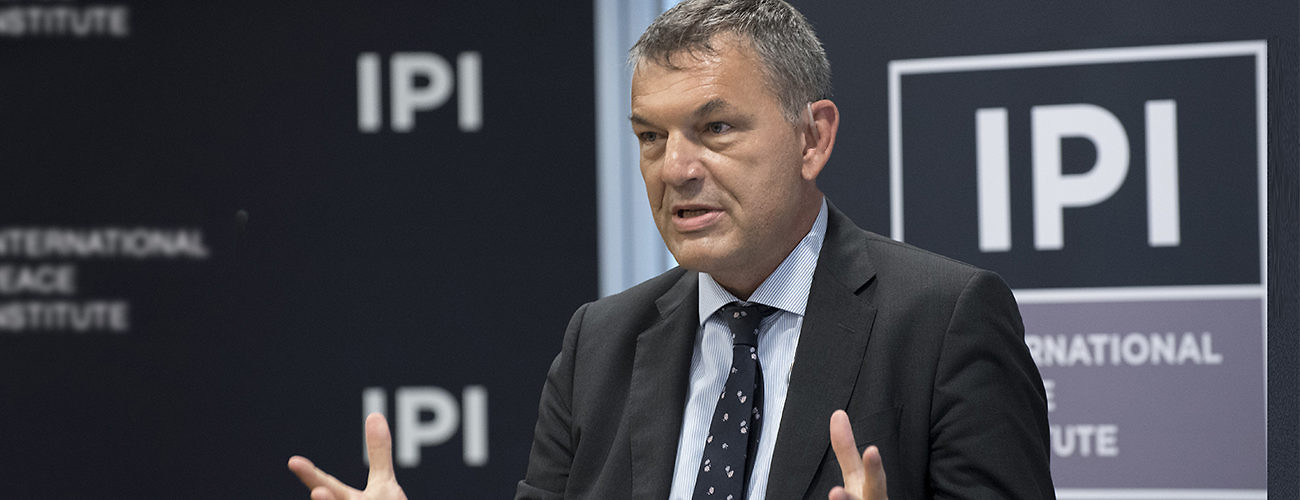Philippe Lazzarini, the United Nations Deputy Special Coordinator, Resident Coordinator and Humanitarian Coordinator for Lebanon, was recalling how Jan Eliasson, the former UN Deputy Secretary-General, described the country to him before he first went there on assignment 30 years ago.
“It’s like a man hanging on the twelfth floor of a building, having a neighborhood looking at him, wondering when this man will fall. And three months later, you still have the same neighborhood wondering exactly the same, with exactly the same man still hanging on the 12th floor. I think it was his way to describe how the country, over the last few years, has constantly been on the edge of the cliff, that it was his way, also, to describe how it was defying, sometimes, rationality or gravity, wondering how come, with all this pressure and all the challenges the country is confronted with, that it is holding.”
Mr. Lazzarini was speaking at an IPI Humanitarian Affairs Series event on October 11th on the humanitarian situation in Lebanon and reflecting on the similarly precarious state of affairs there today.
The country had its first parliamentary election in six years in May, but the installation of a government has been delayed by the failure to name a new cabinet. “There was initially a sense of optimism that a quick cabinet formation could take place, and we were hoping for that because we felt there are so many challenges to be dealt with that we cannot afford to wait too long,” he said.
Cabinet formation is particularly demanding in Lebanon because of political requirements to accommodate the country’s various religious and cultural communities. Further complicating matters, Lebanon is a country with a stalled economy, high unemployment, and a debt that equals 100 percent of its GDP. Potential investors want to see fiscal reform, but that poses a problem for Lebanon in its present state. “To deliver on reform and fiscal prosperity, you need a functioning government,” Mr. Lazzarini said.
The most urgent challenge facing Lebanon today stems from how the political situation in neighboring Syria will evolve and how that will affect the 1.5 million Syrian refugees now in Lebanon and the chances of their returning home one day. The Syrian government has succeeded in regaining control over almost all of the country, with only the Northern city of Idlib still in rebel hands.
“We’re eight years into the conflict, and clearly it is taking a new turn,” Mr. Lazzarini said. “It sounds like it is gearing towards a lower intensity, though that doesn’t mean less complicated. It is triggering a debate about whether it is timely or not to engage fully with the government in Damascus, and, as you know, this is a dividing issue in Lebanon.”
Some 8,000 Syrians have returned home on their own this year, but Mr. Lazzarini said that “the UN is not in a position to facilitate any return to Syria because the conditions in the country are not yet met for a large return.”
He estimated that about three quarters of the refugees were living below the poverty line and one half under the “extreme poverty line.”
He commended the Lebanese for having accommodated what is the highest number of refugees per capita in the world but warned that this had produced understandable host country “fatigue, and the population is really being impacted by the crisis.”
Any progress in Lebanon is measured in small increments, and Mr. Lazzarini said the best claim he could make was that “in the past year we succeeded in stopping a further increase in the vulnerability of the refugees. This means that despite fact that we are in an environment with such a bleak economy, we have succeeded in preventing further deterioration.”
Long-range improvement in Lebanon is dependent upon restoring the economy, but regional conflicts and the involvement of outside powers vexingly keeps the focus on current troubles.
“Promoting durable solutions in Lebanon is essential,” IPI Vice President Adam Lupel, the moderator of the event, said in summing up the conversation.
“Long term development and the strengthening of the Lebanese economy are critical to any sustainable future, yet the standoff around Idlib in northern Syria and the recent Russian-Turkish agreement have placed renewed attention on the current conflict occurring next door, the regional impact of human suffering, and the immediate need for protection, relief and access to basic services.”
Speaker:
Mr. Philippe Lazzarini, United Nations Deputy Special Coordinator, Resident Coordinator and Humanitarian Coordinator for Lebanon








